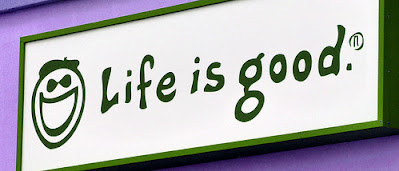 |
| "I don't have the words" |
If you are any kind of a sports fan, you've witnessed something like this. After the championship football game, the sideline reporter grabs the quarterback or other star player of the winning team and asks them what this win means to them. And the next thing you sometimes hear is, "I don't have the words."
It's true. We have moments in our lives when something we experience leaves us... speechless. We are unable to articulate, in that moment, what we are feeling. We say things like, "words fail me." We imply that our vocabulary is inadequate to give a proper description or account of something that is incredibly special or moving. It's not that we have an inadequate vocabulary; it is usually just a case of emotion temporarily overwhelming our communication skill... we can't find the words.
When we were very young, our vocabularies were quite limited. I fondly remember learning new vocabulary words in elementary school. As we grew older, through learning and experience, our vocabularies expanded giving us the database for our written and verbal skills. And it is common knowledge that reading is one of the most powerful ways for children (and adults) to be exposed to and retain vocabulary words. It is believed that an average 20-year old's vocabulary is 42,000 lexemes. (Sit, sits, sat, sitting are 4 words but they are forms of the same lexeme.)
So, having or not having words can be an issue of education/ breadth of vocabulary, a matter of articulation skill or lack thereof, a function of our current emotional state and/or preparedness, or any number of other factors.
All of these words and our ability to hear them, our knowledge of how to read them, and arrange them in such a way that allows us to understand and to express ourselves, reside in multiple regions in our brain. Psychologists and neuroscientists refer to the "language center" to encompass the various parts of the brain that collectively allow us to process language. And it's not just the words we hear, see, and speak. Our very thoughts and ideas are comprised of words/ language. Language is also an essential part of our working memory and cognitive capability.
Almost 8 years ago my wife began to have some struggles with normal communication. She was specifically having trouble with word-finding. When she would get hung up she'd say, "I can't get my words out" and that eventually progressed to "I don't have the words." After a multitude of tests and one very long neuropsychological examination, she was diagnosed with aphasia. And her aphasia was connected to cognitive, memory, and even some early motor issues (apraxia.) In a nutshell... dementia.
Dementia isn't really a disease in and of itself and not all dementias are the same.
Dementia is a brain condition caused by an underlying disease such as Alzheimer's or other diseases like Parkinson's, or vascular disease, or primary progressive aphasia, to name a few. We often think of dementia as primarily memory loss but it involves so many other things.
In Carol's case, the primary areas of her brain that are damaged and are shrinking are the frontal and temporal areas. Eventually the damage will move deeper into areas of the brain that control some pretty important functional parts of the body.
Over the last 8 years, we have moved from "I don't have the words" (which are themselves spoken words in a sentence) to very few words spoken at all. I frequently wonder what her thoughts are. Or if she can still pray silently. I wonder if there is any communication in her dreams. I like to think that there's more going on in her head and it just isn't being made known to all of us.
And, despite this terrible road she has been on, she's the same sweet Carol I've known for nearly 42 years
And how much does she mean to me?
I don't have the words.
Disclaimer: I don't profess to be a doctor, scientist, or expert and therefore what I have written may not perfectly describe the subject matter. I've written what my understanding is from my own observations and research these last few years. Some of it may be a bit inaccurate but, I'm not trying to write a medical abstract. I'm just sharing my opinions and thoughts. Look, I'm just a husband. (But I did stay at a Holiday Inn Express once.)
Some of you may feel that I am oversharing about my wife's illness. I will respond this way. I am finding that expressing my thoughts about this journey is therapeutic for me. I'm not much for journaling so this has become my outlet to write some thoughts down. And maybe this is informative for at least some of you. So, if that's OK, I'll continue sharing my thoughts until I no longer want to or am no longer able. I'm encouraged that we finally speak very openly about conditions affecting women's ta-tas and men's prostates but, we seem to shrink to only whispers in secret when it comes to maladies of and injuries to the brain. We shouldn't feel constrained about talking about this subject. So many people and families are affected by it.
Thanks for reading.











